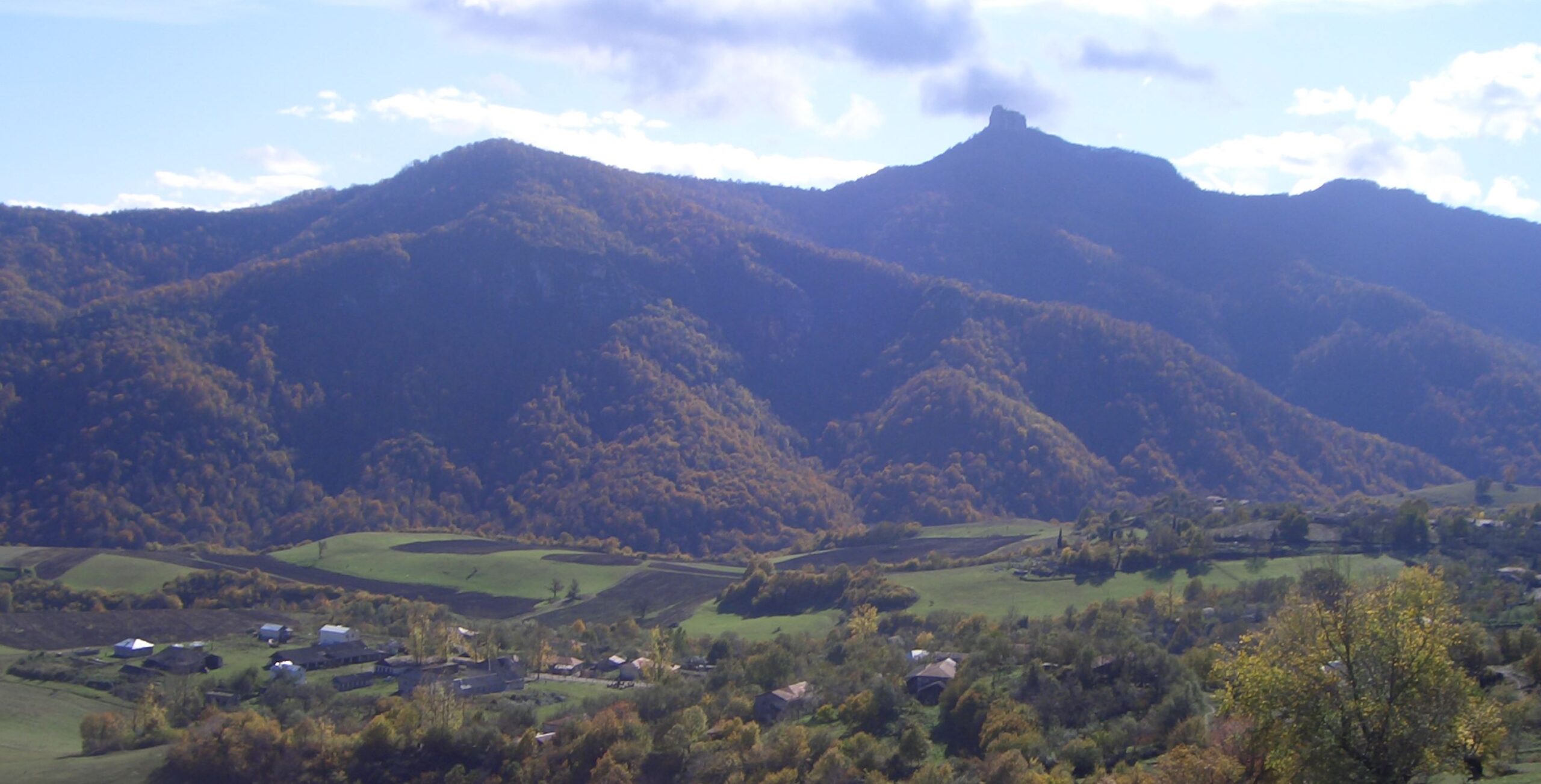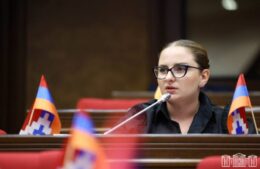323 days and 92 kilometers from home
- (0)

A view of Kolatak village in Artsakh
By Ani Ghevondyan
“The loss of Artsakh matured me. I began to understand many things differently. I feel like a lot of people my age don’t think like me, because they haven’t been through this,” Amalia Jhangiryan told me.
The 18-year-old reflected on what has changed in her since she was forcibly displaced from Artsakh one year ago. Her parents were born and raised in Stepanakert and lived in Kolatak village in the Martakert district. Last September, she was admitted to the Shushi University of Technology. When she started school, she moved to Stepanakert and lived with her grandmother. That month was the last for students studying in Artsakh educational institutions. “I walked from one end of the city to the other,” Jhangiryan said, recalling her first day of school in Artsakh. “The college where I studied was on a hill. There were people who were carrying their wives in their arms to the maternity hospital.”
She worked in Stepanakert under the blockade. For nine months, Azerbaijan closed the Lachin Corridor, the sole route connecting Artsakh to Armenia and the rest of the world. In the absence of most sweets, at first the store made and sold ice cream. Like all food products, raw materials for ice cream soon ran out. In August 2023, Azerbaijani forces closed the entrance to Artsakh to the Russian peacekeeping forces and the International Committee of the Red Cross organization, cutting off the Armenian population from all humanitarian aid. Jhangiryan’s family ran out of their reserves of flour, so her grandmother had to stand in line for bread. “The bread was hard as a stone and had the color of a stone,” Jhangiryan said.
The more than 100,000 displaced Armenians from Artsakh share similar stories from the blockade. Jhangiryan’s story is no exception. She remembers empty shops, non-functioning public transport, bread queues and power outages. The only options were to help each other and “fight to the end.” She did not imagine how things would end. “I thought that the blockade was just another difficulty. We were fighting. We were ready to resist until the end,” she said.
“On September 19, my father, not being able to contact me, told my brother: ‘Go home, the attack has started.’ My brother somehow informed me. Before reaching home, two stops away, I heard a very loud noise. I had no idea that it had already started. People started running left and right. That day, I had bread in my hand and a bag. I ran quickly. I didn’t know where to go. At that moment I was thinking about my parents,” Jhangiryan said.
She did not have any information from her family members for several hours. She eventually found her grandmother and brother and went to a bunker. “We spent the night there, sitting on the sand, under the sound of gunfire. We were constantly receiving news — ‘we have a large number of victims,’ ‘this village is under siege.’ In the morning, news spreads that we have signed some paper, surrendered and we have to leave. At that moment, I didn’t even think that we would go out and that’s it,” she said.
That paper was the September 20, 2023 statement signed by the President of Artsakh Samvel Shahramanyan. It stated that the authorities of Artsakh accept the proposal of the command of the Russian peacekeeping mission regarding the cessation of fire. The parties agreed on the withdrawal of “the remaining units and servicemen of the Armed Forces of Armenia,” the dissolution and complete disarmament of the armed formations of Nagorno-Karabakh, and the withdrawal of heavy military equipment and weapons from Nagorno-Karabakh “for the purpose of their early utilization.”
Their mother soon joined them, but they did not hear from their father for three days. During that time, the limited information available tormented Jhangiryan. “Everyone said that it was possible to let the women and children go out, but the men would stay. Then they said that they would not allow the military to cross the Hakari bridge. My parents were soldiers in the Artsakh Defense Army.” After telling this story, Jhangiryan was silent for a long time.
When the whole family was reunited, they left by car on September 25. “We left Stepanakert, not knowing if my parents would pass or not. We left without entering the house and taking anything. No one thought of entering the house, saying goodbye or taking anything. We thought, it’s our house. It will calm down soon, and we’ll go back. We hadn’t reached the checkpoint yet. I was hiding my tears the whole way. My father told my brother: if something happens, don’t interfere. If they take me out of the car and don’t let me go, you sit at the wheel, drive and go ahead. We reached the checkpoint. We were told to roll down all four windows. A soldier approached the car. He spoke Russian. He put his head inside, looked and asked how many people there were. He also checked the trunk. I don’t know how we managed to pass, fortunately. After crossing Hakari bridge, the Armenian National Security Service also checked us. They asked my father how many children were in the car. They gave us two pastries. I wanted to cry. I thought, it’s the 21st century,” she said.
“We were given accommodations in Goris, and we stayed there. It is a very nice city, very close to Artsakh,” Jhangiryan continued. “I liken Goris to Stepanakert — the climate, the humidity. Maybe I think so because we are close to Artsakh. But I still can’t fulfill my longing. Goris is similar to Stepanakert, but nothing will reach Artsakh. There is nothing like Artsakh.”
Now Jhangiryan is focused on her goals and education. She studies at the Goris State Agricultural College. Jhangiryan is a future food technologist. She hopes to apply to the National Agrarian University of Armenia after finishing her studies in college. She felt welcomed at the college and quickly integrated into the new environment. “I speak a lot in the Artsakh dialect. In college they tell me a lot: ‘You speak in your dialect, and we will understand anyway.’” She had many friends in Artsakh and keeps in touch with them. She has also made new friends in Goris. She talks to everyone about Artsakh. “The first thing I tell those who don’t know about the cleanliness of Artsakh is that Stepanakert is the cleanest city.”
To the question of what she wants the most, Jhangiryan answered, “I want to go back to Artsakh. I know it’s a bit unbelievable, but I believe.”


















